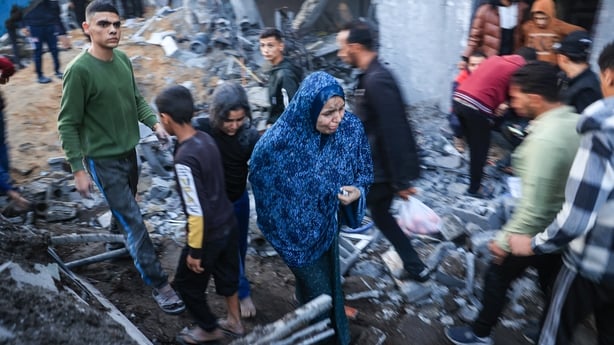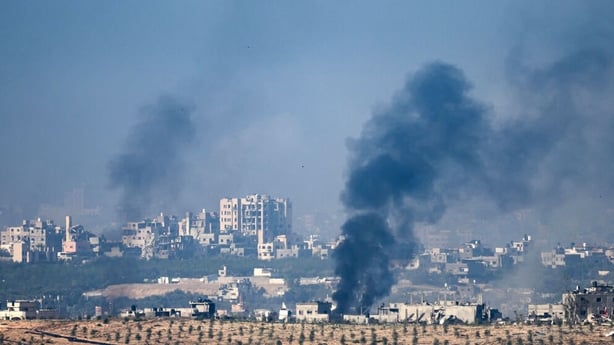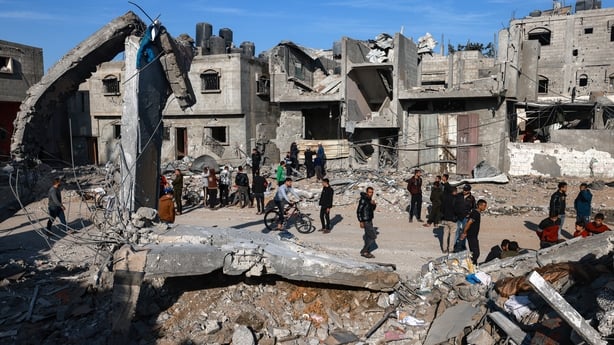Intense Israeli air strikes have hit the south of Gaza, killing and wounding dozens of Palestinians, including in areas where Israel had told people to seek shelter, residents and journalists on the ground said.
Israeli troops and tanks also pressed the ground campaign against Hamas militants in the south of the enclave after having largely gained control of the now-devastated north.
Earlier today, Israel ordered Palestinians to leave parts of Gaza's main southern city, Khan Younis. But residents said that areas which they had been told to go to were also coming under fire.
Israel's military posted a map on social media platform X with around a quarter of Khan Younis marked off in yellow as territory that must be evacuated at once.
Three arrows pointed south and west, telling people to head towards the Mediterranean coast and towards Rafah, a major town near the Egyptian border.
Desperate Gazans in Khan Younis packed their belongings and headed towards Rafah. Most were on foot, walking past ruined buildings in a solemn and silent procession.
But the head of the United Nations agency for Palestinian refugees in Gaza (UNRWA), Thomas White, said people in Rafah were themselves being forced to flee.
"People are pleading for advice on where to find safety. We have nothing to tell them," he said on X.

In the territory's northern part, the official Palestinian news agency WAFA said at least 50 people were killed in an Israeli air strike that hit two schools sheltering displaced people in the Daraj neighbourhood of Gaza City.
The Gaza health ministry could not be reached for comment on the report and it was not immediately possible to verify it independently. A spokesperson for the Israeli army said it was looking into the report.
Separately, the health ministry said at least 15,899 Palestinians, 70% of them women or under 18s, have now been killed in Israeli bombardments of the Hamas-ruled enclave in eight weeks of warfare. Thousands more are missing and feared buried in rubble.
Israel launched its assault to wipe out Hamas in retaliation for an 7 October cross-border attack by its gunmen. They killed 1,200 people and seized 240 hostages, according to Israeli tallies - the deadliest single day in Israel's 75-year history.
Bombing at one site in Rafah overnight had torn a crater the size of a basketball court out of the earth.
Israel has accused Hamas of putting civilians in danger by operating from civilian areas, including in tunnels which can only be destroyed by large bombs. Hamas denies it does so.

As many as 80% of Gaza's 2.3 million people have fled their homes in the Israeli bombing campaign that has reduced much of the crowded coastal strip to a desolate wasteland.
Israeli forces largely captured the northern half of Gaza last month, and since a week-long truce collapsed on Friday they have swiftly pushed deep into the southern half.
Tanks have driven into Gaza from the border fence and cut off the main north-south route, residents say. The Israeli military said the central road out of Khan Younis to the north "constitutes a battlefield" and was now shut.
Hamas said its fighters clashed with Israeli forces in northern Khan Younis overnight.
Meanwhile, the commander of Israel's armoured corps, Brigadier-General Hisham Ibrahim, told Army Radio the military had almost achieved its goals in northern Gaza.
"We are beginning to expand the ground manoeuvre to other parts of the Strip, with one goal - to topple the Hamas terrorist group," he said.
The military released footage of troops patrolling in tanks and on foot, in fields and in badly damaged urban areas, and firing from weapons, without specifying the location in Gaza.
Israel says its evacuation orders are aimed at protecting civilians from harm, and called on international organisations to help encourage Gazans to move to the areas labelled safe on Israeli maps.
The United Nations said the areas in the south that Israel has ordered evacuated in the three days since the truce ended had housed over 350,000 people before the war - not counting the hundreds of thousands now sheltering there from other areas.
In Khan Younis, many of those taking flight today were already displaced from other areas. Abu Mohammed told Reuters it was now the third time he had been forced to flee since abandoning his home in Gaza City in the north.
"Why did they eject us from our homes in Gaza (City) if they planned to kill us here?" he said.
Israel's closest ally the United States has called on it to do more to safeguard civilians in the southern part of Gaza than in last month's campaign in the north.
But about 900 people have been killed in Israeli air strikes since the truce ended on Friday, Gaza health authorities said.
Omar Shakir, Israel and Palestine Director at Human Rights Watch, told Reuters: "All indications and reports suggest that the same pattern - of dropping heavy-duty bombs and using artillery in densely populated areas - is continuing."
Read full coverage of the ongoing conflict here
The Red Cross president arrived in Gaza today, calling for the protection of civilians in the Palestinian territory, where she warned that human suffering was "intolerable".
The International Committee of the Red Cross (ICRC) said ICRC president Mirjana Spoljaric's trip to the region would happen in several stages with "a visit to Israel expected over the coming weeks".
"I have arrived in Gaza, where people's suffering is intolerable," Ms Spoljaric said on X.
"It is unacceptable that civilians have no safe place to go in Gaza, and with a military siege in place there is also no adequate humanitarian response currently possible," she added in an ICRC statement.

Ms Spoljaric, whose organisation has faced criticism from both sides in the conflict for not providing adequate help to Israeli hostages held by Hamas and Palestinian prisoners held by Israel, insisted that "all those deprived of liberty must be treated humanely".
She said: "The hostages must be released, and the ICRC must be allowed to safely visit them.
"The last week provided a small degree of humanitarian respite, a positive glimpse of humanity that raised hopes around the world that a path to reduced suffering could now be found," Spoljaric said in the statement.
"As a neutral actor, the ICRC stands ready to support further humanitarian agreements that reduce suffering and heartbreak."
She said the purpose of her visit was "to advance efforts that alleviate the desperate humanitarian situation".
"I will convey my deep concern for the plight of civilians and underline the ICRC's utmost commitment to doing everything we can to ease their suffering," she added.
The ICRC said that during her visit to Gaza, Spoljaric would also spend time with the organisation's team on the ground and "visit the European Hospital, where ICRC medical teams have been conducting life-saving surgery alongside local healthcare workers".
"We have urgently appealed for civilian life to be protected and respected on all sides, in line with international humanitarian law, and I reiterate that appeal today," Ms Spoljaric said, insisting that "an unimpeded and regular flow of aid must be allowed to enter Gaza".
